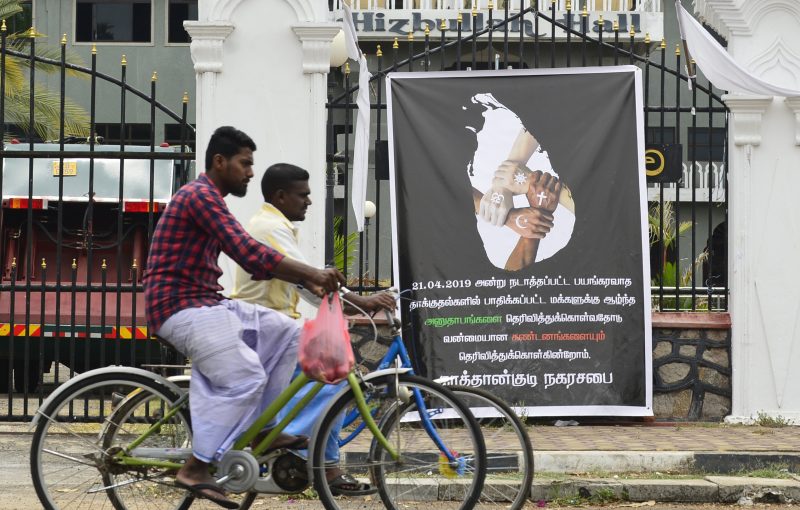Suicide bombers fuel fears among Sri Lanka’s majority Buddhists
People of different faiths have been nervous to attend public sites of worship in the aftermath of the bombings (LAKRUWAN WANNIARACHCHI)
Colombo (AFP) – Soldiers guarded the gate, but Colombo’s landmark Gangaramaya temple was virtually empty, a potent sign of anxiety felt by Sri Lanka’s majority Buddhist community since the Easter Sunday suicide attacks.
The normal stream of faithful and tourists has fallen to a trickle since the April 21 attacks on churches and hotels that killed more than 250 people.
Many of Sri Lanka’s 15 million Buddhists fear they too could become a jihadist target. Wild rumours of attacks fly around each day — building unease which observers say serves the cause of Buddhist radicals.
Nilman Ekanayake, a 29-year-old Sri Lankan on holiday from his job as a manufacturing manager in Britain, said Wednesday he has never seen Gangaramaya so empty.
“There is a lot of speculation at the moment,” he told AFP. “They have targeted a church, a place of worship. A Buddhist temple is another place of worship. It’s an unknown for the public.”
“Going out in the streets in Colombo at around eight o’clock, it’s like three or four in the morning. There’s nobody out there and I’ve never experienced that in my lifetime.”
Pallegama Rathanasara, a monk at the temple, also highlighted the uncertainty.
“The intelligence services say the next attack will be on a Buddhist temple,” he claimed.
– ‘Fear psychosis’ –
While the the main victims of the recent attacks were Christian, the Easter attacks have strengthened a minority of Buddhist extremists who want an authoritarian Buddhist state, political commentator Kusal Perera said.
“The ordinary Buddhists are made to feel that they are under threat,” Perera told AFP. “This is the way Buddhist extremists can remain relevant.
“What we are seeing is the creation of a fear psychosis among the Buddhists. The end result will be a militarised society,” he warned.
The government has come under criticism after it admitted that it had prior warnings about the suicide bomb attacks, which have been claimed by the Islamic State group.
Firebrand Buddhist monks also accuse the government of failing to heed their warnings about militants too. The Bodu Bala Sena (BBS), or Buddhist Force, argues that the bombings have vindicated their warnings of Islamic radicalisation.
“Wahabism is working in the country,” BBS national organiser Witharandeniye Nanda told AFP, referring to a strict Sunni version of Islam.
“They (the government) did not do anything about our warnings. If they paid attention to what we were saying, this tragedy could have been avoided,” the monk added.
“The Sinhalese (Buddhist) politicians saw us as a political rivals and called us nationalists, religious extremists,” he said. “Instead of taking our warnings seriously, they tried to suppress us.”
The group’s leader, monk Galagodaatte Gnanasara, is currently serving a six-year jail term for contempt of court.
He has been accused of a string of hate crimes against Muslims but never been prosecuted.
At a court appearance for another case last week, Gnanasara told reporters he feared Islamic extremists could target Buddhist temples.
With the top monk in jail, the BBS no longer spews venomous rhetoric against minorities, but has instead put its efforts into a campaign for Gnanasara’s release.
– Faith deficit –
While investigating its own failure to heed Indian intelligence warnings of the attacks, the government has declared a state of emergency giving sweeping powers to security forces to arrest and detain suspects.
That has added to the nationwide nerves that has unsettled Muslim, Buddhist, Hindu and Christian places of worship.
One leading moderate Buddhist monk, Omalpe Sobitha, urged Sri Lanka’s Roman Catholic leader, Cardinal Malcolm Ranjith, to initiate inter-religious dialogue to defuse tensions.
“It is the Catholic community which suffered the most in the Easter attacks and we stand with them,” Sobitha said.
“The cardinal should chair an interfaith movement to ensure better understanding.”
The monk also urged the Islamic clergy to be vigilant about radical elements within their community.
“The first steps against ‘Muslim terrorism’ should be taken by Muslim clerics because they are the ones who know the most about their communities,” he added.
Disclaimer: Validity of the above story is for 7 Days from original date of publishing. Source: AFP.


